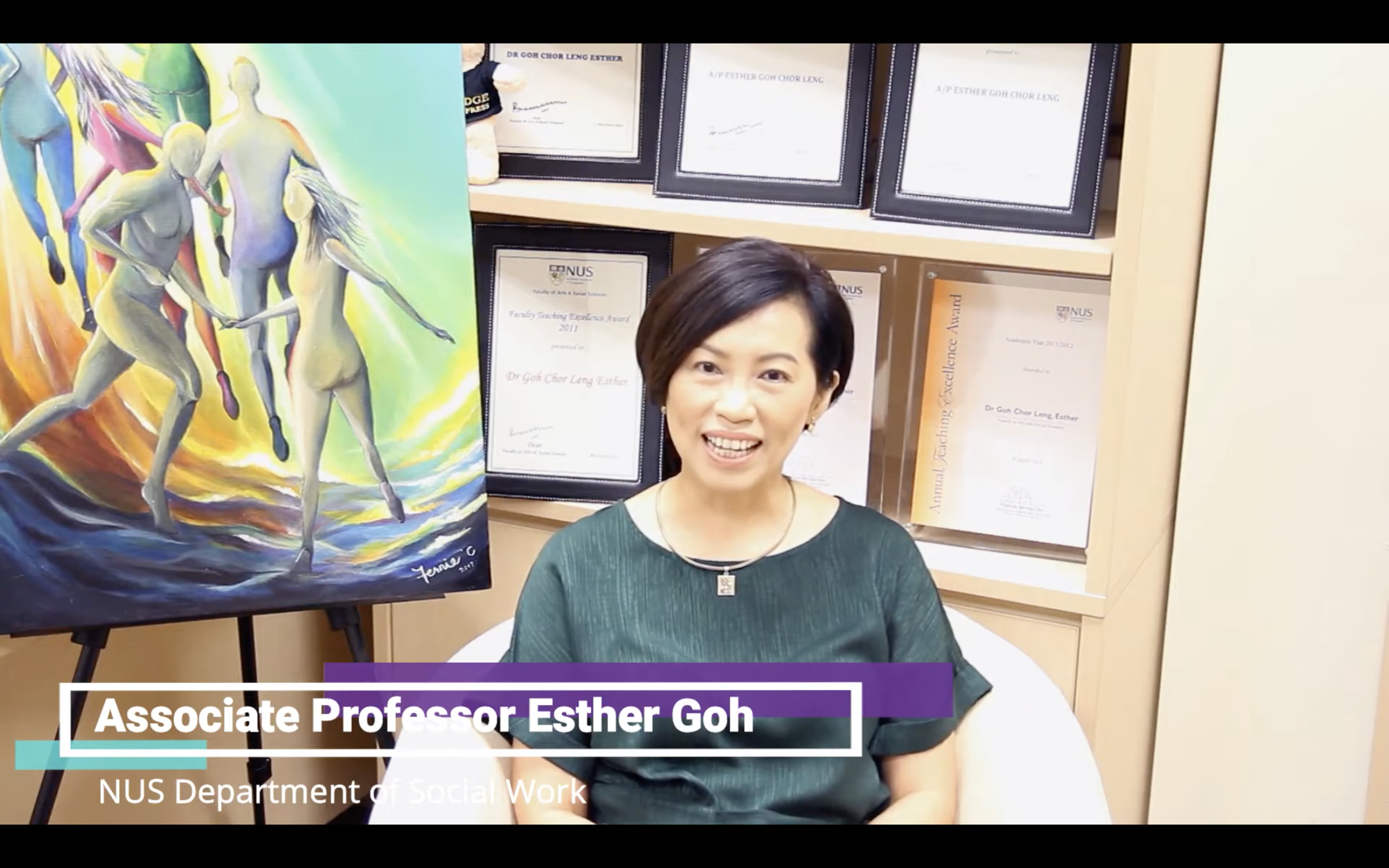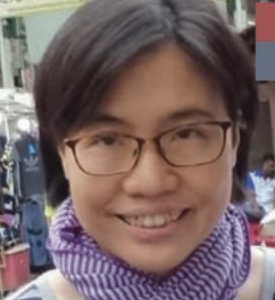
Why pursue graduate study in Social Work?
Social Work graduate programmes deliver a broad-based education centered on advanced direct and indirect social work practice, offering students a holistic and integrated approach to the study of the discipline.
With a range of modules that includes clinical social work intervention with specific client groups, policy analysis and social planning, agency management and programme development, social work research and programme evaluation, students build their innovative capacity of being future-ready social work professionals who are equipped with strong and distinct leadership qualities and cross-sector mobility in the Singaporean social service sector.
The Master of Social Work programme aims to produce the leaders of social work profession in direct practice, social policy and research, and social administration and development. In addition, the Graduate Diploma in Social Work enables non-social work degree graduates to pursue professional social work education.

Graduate Coordinators' Message
Dr Pon Kwai Ling, Alicia
Masters (Coursework) and Graduate Diploma Coordinator
Assoc Prof Choo Hyekyung
Masters & PhD (Research) Coordinator.
Programmes & Curriculum
About the Course
The Graduate Diploma in Social Work (GDSW) programme is for
- persons holding degrees earned from reputable universities other than social work, currently working in social service sector and acquiring knowledge and skills of social work and would be qualified for accreditation as social worker after completion of GDSW;
- persons holding degrees earned from reputable universities who are planning to switch their career into social work.
The objective is to train non-social work graduates to be competent social service professionals by providing professional knowledge and skills in:
- Social work theory and practice;
- Social service delivery systems; and
- Specialised fields of social intervention.
Course Structure
For Students Admitted from AY 2007/08 Onwards (updated May 07)
A candidate for the Graduate Diploma in Social Work must offer not fewer than five modules and a social work practicum.
The Graduate Diploma in Social Work programme comprises the following components:
- 4 Essential modules*
- 1 Elective module
- 1 Social Work Practicum
* Candidates possessing a recognised social work academic qualification may be exempted from one or more essential modules if they had already done similar modules in their undergraduate degree. The exempted essential module(s) will be replaced with elective module(s) as approved by the Head of Department of Social Work.
Essential Modules
- SWD5102 Social Work with Groups and Community
- SWD5103 Contemporary Social Work Practice
- SWD5104 Human Development in Context
- SWD5105 Skills in Advanced Social Work Practice
Elective Modules
- For the full list of elective modules, please see here.
Social Work Practicum
- SWD5120 Social Work Practicum
About the Course
The objective of the MSW programme is to produce the leaders of the social work profession in direct practice, social policy and research, and social administration and development. Integrative learning, interdisciplinary exposure and innovative capacity building are key pedagogical features of our MSW programme.
The MSW programme is designed to facilitate students’ systematic integration of social work professional values and practice, theory and practice, and research and practice in every class. It also offers students interdisciplinary learning opportunities to take modules from other departments within the faculty as well as public policy, public health, and health sciences modules in other faculties and schools to their special interest. In our MSW programme, students can expect to build their innovative capacity of being future-ready social work professionals who are equipped with strong and distinct leadership qualities and cross-sector mobility in the Singaporean social service sector.
Course Structure
Core Modules — Students must complete 5 core modules (total 20 MCs)
- SWM5117A Practice Research Capstone Seminar I
- SWM5117B Practice Research Capstone Seminar II
- SWM5104 Management of Human Service Organizations
- SWM5209 Theory and Practice of Social Work Supervision
- SWM5215 Poverty and Asset Building Policy
Elective Modules — Students are required to complete any five modules (total 20 MCs) with at least a module from each basket of modules: Direct Practice and Research & Evaluation.
- For the full list of modules, please see here.
About the Course
The Master of Social Sciences (Social Work by Research) degree provides professional and research skills for graduates and professionals working in social work or social administration. Candidates with a good degree in social work can be considered. Research scholarships are available.
Supervision is available in areas of research such as; family studies, social work practice, intervention outcomes, ageing issues, social support networks, community development, evaluation of service delivery, social policies, volunteerism, crime and delinquency, mental health, drug abuse, coping behaviour, social-ecological response, human service management, and rehabilitation of persons with disabilities.
Course Structure
1. Complete and pass:
- 4 modules (at least 75% of the total modular credit (MC) requirements must be at level 5000 or 6000, including an essential module SW6770).
- Where applicable, obtained a satisfactory grade in the graduate English course at intermediate level
- Thesis
2. Obtain a minimum Cumulative Average Point (CAP) of 3.00.
About the Course
The Doctor of Philosophy (social work by research) is a research intensive advanced course for qualified social workers committed to their continuing professional education. Candidates with a good degree in social work can be considered and they will need to undertake research work in social work practice or human service arena under the supervision of an assigned academic staff. Research scholarships are available.
Supervision is available in areas of research such as; family studies, social work practice, intervention outcomes, ageing issues, social support networks, community development, evaluation of service delivery, social policies, volunteerism, crime and deliquency, mental health, drug abuse, coping behaviour, social-ecological response, human service management, and rehabilitation of persons with disabilities.
Course Structure
To successfully graduate with a PhD, students are expected to achieve the following:
- Complete and pass 6 modules (at least 75 % of the total modular credit (MC) requirements must be at level 5000 or 6000, including an essential module SW6770).
- Obtain a minimum Cumulative Average Point (CAP) of 3.50
- Where applicable, obtain a satisfactory grade in the graduate English course at advanced level
- Pass a PhD Qualifying Examination
- Pass an Oral Examination
- Submit and pass a Thesis
Job Ready
Social work graduates have a wide range of exciting and fulfilling professional job opportunities. Organisations that employ social workers include the following:
- Government Ministries – Social and Family Development, Health, Home Affairs, Defence, and Education;
- Family service centres;
- Hospitals and health care centres;
- Social Service Agencies (voluntary welfare organisations);
- Special Education Needs Schools;
- Youth and Children service agencies;
- Senior and eldercare agencies;
- National Council of Social Service (which includes the Community Chest and the Social Service Training Institute);
- People's Association, Community Development Councils and Constituency Secretariats; the National Youth Council;
- Prisons, drug rehabilitation centres and halfway houses;
- International and local Non-Government Organisations; as well as
- Other people-helping agencies serving families, children, youth, people with disabilities and older persons.
Our social work graduates are also involved in areas such as social enterprises, volunteer management, international aid and services, industrial labour relations, human resource management, staff training, organizational development and consultancy, mass communication and human relations.
Testimonials

Michelle Shanthini Gunasilan
Masters Student in Social Work
The opportunity to undertake the Master of Social Work programme at NUS has been an experience I am grateful for. The modules that I have undertaken have allowed me to deepen my clinical skills while providing me opportunities to enlarge my views about social work leadership and management. Through various modalities, the lecturers created learning environments that supported lively discussions, promoted critical analysis and creative ways of addressing social issues.
I have also enjoyed the opportunities to learn from my classmates from different professional fields who contributed towards a challenging yet nurturing learning journey. This programme has enriched my professional development and has equipped me with knowledge and skills that I hope can value add to the social work sector.
Ng Siang Kiat
PhD Student in Social Work
The PhD journey is hardgoing. I had to constantly juggle my PhD studies with being a stay-at-home mum to three school-going children, active involvement in church and counselling in my private practice.
Taking up this endeavour is nothing short of calling. So when purpose transcends present circumstances, it helps me look beyond challenges to find meaning in the research topic in fieldwork experience with participants and fulfilment in being a voice for the marginalised in the world of social work practice and research.

The Faculty of Arts and Social Sciences, National University of Singapore (NUS) is committed to environmental sustainability.
This e-brochure is part of our sustained effort to reduce waste and foster a culture of care for the environment among the NUS and broader community.

